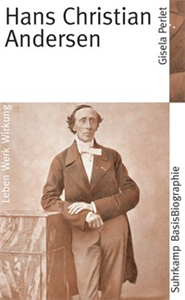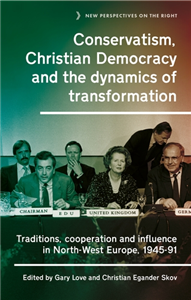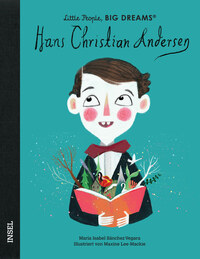Your Search Results
-
Promoted ContentMarch 2005
Hans Christian Andersen
by Gisela Perlet
Der Werdegang Hans Christian Andersens vom armen Schustersohn zum erfolgreichen Schriftsteller mutet wie ein Märchen an. Allerdings bemühte er sich auch nach Kräften, diesen Mythos zu pflegen. Andersens Figuren traten schon zu seinen Lebzeiten ihren Siegeszug durch die Welt an und sind bis heute unvergessen.
-
Promoted Content2025
Why Be a Christian Today?
by Elisabeth Zoll / Thomas Seiterich (eds.)
The exciting texts and reports by professing Christians offer a fresh perspective for all those who have cultivated a Christian spirituality for many years. However, the book also provides easy access for those who are newly interested in the Christian faith. There are probably as many professions of Christian faith as there are believers in the world. But what do Christians think and how have they been moulded? Elisabeth Zoll and Thomas Seiterich have compiled very personal ideas about the Christian faith in this book. When selecting the contributors, the editors deliberately chose not to include people with church offices or specialised theologians. Irrespective of church policy issues and church scandals, the contributors have provided insights into their path to faith.
-
 Trusted Partner
Trusted Partner
-
 Trusted Partner
November 2010
Trusted Partner
November 2010Lebenslust mit Christian Morgenstern
by Christian Morgenstern, Thomas Kluge
Christian Morgenstern wurde am 6. Mai 1871 in München geboren. 1892/93 begann er ein Studium der Rechtswissenschaften an der Universität Breslau, das er bald abbrach. Er zog nach Berlin und war dort als Journalist, Kultur- und Literaturkritiker und Redakteur tätig und veröffentlichte zahlreiche Beiträge und Glossen in Zeitschriften. Sein erster von seinen insgesamt vierzehn Lyrik-Bänden In Phantas Schloß erschien 1895. In der Folgezeit beschäftigte er sich mit der Übersetzung und Herausgabe der Werke von August Strindberg und Henrik Ibsen und schrieb für Max Reinhardts Berliner Kabarett »Schall und Rauch«. Von 1903 bis 1905 war er Redakteur der Zeitschrift »Das Theater« im Verlag von Bruno Cassirer, für den er auch als freier Lektor arbeitete. 1909 schloß sich Morgenstern dem Kreis der antroposophischen Gesellschaft um Rudolf Steiner an. Am 31. März 1914 starb er in Meran / Italien an den Folgen einer Tuberkulose-Erkrankung.
-
 Trusted Partner
Literature & Literary StudiesJune 2022
Trusted Partner
Literature & Literary StudiesJune 2022Medieval literary voices
by Louise D’Arcens, Sif Ríkharðsdóttir
-
 Trusted Partner
Humanities & Social SciencesJuly 2025
Trusted Partner
Humanities & Social SciencesJuly 2025Conservatism, Christian Democracy and the dynamics of transformation
Traditions, cooperation and influence in North-West Europe, 1945-91
by Gary Love, Christian Egander Skov
Conservatism, Christian Democracy, and the Dynamics of Transformation compares the centre-right political traditions of Britain, the Nordic countries, France, West Germany, and Austria and looks for evidence of political cooperation and influence across borders during the period 1945-90. The book explores howa variety of intellectuals, politicians, and political parties transformed their politics in response to major economic, social, and political challenges and seeks to explain why conservatives and Christian democrats came to feel that they belonged to a wider centre-right political family by the end of this period. It also examines why these political traditions found it difficult to cooperate with each other after the Second World War and why they decided to invest more political capital in inter-party relations and wider transnational projects from the 1960s. As the book shows, these developments resulted in two new centre-right internationals: the European Democrat Union and the International Democrat Union.
-
 Trusted Partner
Literature & Literary StudiesMay 2023
Trusted Partner
Literature & Literary StudiesMay 2023Counterfactual Romanticism
by Damian Walford Davies
Innovatively extending counterfactual thought experiments from history and the social sciences to literary historiography, criticism and theory, Counterfactual Romanticism reveals the ways in which the shapes of Romanticism are conditioned by that which did not come to pass. Exploring various modalities of counterfactual speculation and inquiry across a range of Romantic-period authors, genres and concerns, this collection offers a radical new purchase on literary history, on the relationship between history and fiction, and on our historicist methods to date - and thus on the Romanticisms we (think we) have inherited. Counterfactual Romanticism provides a ground-breaking method of re-reading literary pasts and our own reading presents; in the process, literary production, texts and reading practices are unfossilised and defamiliarised.
-
 Trusted Partner
Literature & Literary StudiesFebruary 2015
Trusted Partner
Literature & Literary StudiesFebruary 2015Biblical women in early modern literary culture, 1550–1700
1550–1700
by Edited by Victoria Brownlee and Laura Gallagher
At once pervasive and marginal, appealing and repellent, exemplary and atypical, the women of the Bible provoke an assortment of readings across early modern literature. Biblical women in early modern literary culture, 1550-1700 draws attention to the complex ways in which biblical women's narratives could be reimagined for a variety of rhetorical and religious purposes. Considering a confessionally diverse range of writers, working across a variety of genres, this volume reveals how women from the Old and New Testaments exhibit an ideological power that frequently exceeds, both in scope and substance, their associated scriptural records. The essays explore how the Bible's women are fluidly negotiated and diversely redeployed to offer (conflicting) comment on issues including female authority, speech and sexuality, and in discussions of doctrine, confessional politics, exploration and grief. As it explores the rich ideological currency of the Bible's women in early modern culture, this volume demonstrates that the Bible's women are persistently difficult to evade. ;
-
 Trusted Partner
Literature & Literary StudiesJune 2025
Trusted Partner
Literature & Literary StudiesJune 2025Critical games
On play and seriousness in academia, literature and life
by Tim Beasley-Murray
Critical Games is about the games we play (whether we know it or not), the ways we play them (for fun, but also to win, and to gain approval from others), and what happens when they get out of hand. The book interrogates the theory of play and gaming, with a particular focus on the games played by literary authors and literary critics. Drawing on (often self-critical) autobiography, as well as readings in texts across a range of languages, Tim Beasley-Murray plays with academic conventions to highlight what is at stake in them, turning to the Game of Literature, from Kafka to Carrère, to seek models and warnings of the outcomes of taking games too seriously, or not taking them seriously enough.
-
 Trusted Partner
Humanities & Social SciencesJanuary 2013
Trusted Partner
Humanities & Social SciencesJanuary 2013Christian Dualist Heresies in the Byzantine World, c. 650-c. 1450
by Janet Hamilton, Bernard Hamilton
Christian dualism originated in the reign of Constans II (641-68). It was a popular religion, which shared with orthodoxy an acceptance of scriptual authority and apostolic tradition and held a sacramental doctrine of salvation, but understood all these in a radically different way to the Orthodox Church. One of the differences was the strong part demonology played in the belief system. This text traces, through original sources, the origins of dualist Christianity throughout the Byzantine Empire, focusing on the Paulician movement in Armenia and Bogomilism in Bulgaria. It presents not only the theological texts, but puts the movements into their social and political context.
-
 Trusted Partner
Literature & Literary StudiesJanuary 2013
Trusted Partner
Literature & Literary StudiesJanuary 2013The world of El Cid
Chronicles of the Spanish Reconquest
by Simon Barton, Richard Fletcher
Makes available, for the first time in English translation, four of the principal narrative sources for the history of the Spanish kingdom of León-Castile during the eleventh and twelfth centuries. Three chronicles focus primarily upon the activities of the kings of León-Castile as leaders of the Reconquest of Spain from the forces of Islam, and especially upon Fernando I (1037-65), his son Alfonso VI (1065-1109) and the latter's grandson Alfonso VII (1126-57). The fourth chronicle is a biography of the hero Rodrigo Díaz, better remembered as El Cid, and is the main source of information about his extraordinary career as a mercenary soldier who fought for Christian and Muslim alike. Covers the fascinating interaction of the Muslim and Christian worlds, each at the height of their power. Each text is prefaced by its own introduction and accompanied by explanatory notes.
-
 Trusted Partner
Literature & Literary StudiesMarch 2025
Trusted Partner
Literature & Literary StudiesMarch 2025The Catholicism of literature in the age of the Book of Common Prayer
Poetry, plays, works, 1558-1689
by Thomas Rist
Offering a complete reading of English Literature throughout 1558-1689, this book demonstrates the continuity of Roman Catholicism in English Literature from the accession of Elizabeth I to the deposing of James II. Rist shows that poetry and plays promoted Roman Catholic ideas in a Biblicist age which established the Church of England through the Book of Common Prayer. From the very idea of literary works to chapters on the Eucharist, Purgatory, Christian worship and the Virgin Mary, Rist joins together major and minor authors of the era to present English Literature afresh. Important literary figures include William Shakespeare, Ben Jonson, Thomas Middleton, Queen Henrietta Maria, John Donne, John Dryden, Robert Herrick, Margaret Cavendish and Aphra Behn.
-
 Trusted Partner
The ArtsJune 2021
Trusted Partner
The ArtsJune 2021Lukácsian film theory and cinema
A study of Georg Lukács' writing on film 1913–1971
by Ian Aitken
Lukácsian film theory and cinema explores Georg Lukács' writings on film. The Hungarian Marxist critic Georg Lukács is primarily known as a literary theorist, but he also wrote extensively on the cinema. These writings have remained little known in the English-speaking world because the great majority of them have never actually been translated into English - until now. Aitken has gathered together the most important essays and the translations appear here, often for the first time. This book thus makes a decisive contribution to understandings of Lukács within the field of film studies, and, in doing so, also challenges many existing preconceptions concerning his theoretical position. For example, whilst Lukács' literary theory is well known for its repudiation of naturalism, in his writings on film Lukács appears to advance a theory and practice of film that can best be described as naturalist. Lukácsian film theory and cinema is divided into two parts. In part one, Lukács' writings on film are explored, and placed within relevant historical and intellectual contexts, whilst part two consists of the essays themselves. This book will be of considerable interest to scholars and students working within the fields of film studies, literary studies, intellectual history, media and cultural studies. It is also intended to be the final volume in a trilogy of works on cinematic realism, which includes the author's earlier European film theory and cinema (2001), and Realist film theory and cinema (2006).
-
 Trusted Partner
Trusted Partner
-
 Trusted Partner
Trusted Partner
-
 Trusted Partner
Trusted Partner
-
 Trusted Partner
Trusted Partner
-
 Trusted Partner
The ArtsJune 2021
Trusted Partner
The ArtsJune 2021Contemporary Spanish cinema and genre
by Jay Beck, Vicente Rodríguez Ortega
This volume is the first English-language collection exclusively dedicated to the study of genre in relation to Spanish cinema. Providing a variety of critical perspectives, the collection gives the reader a thorough account of the relationship between Spanish cinema and genre, drawing on case studies of several of the most remarkable Spanish films in recent years. The book analyses the significant changes in the aesthetics, production and reception of Spanish film from 1990 onwards. It brings together European and North American scholars to establish a critical dialogue on the topics under discussion, while providing multiple perspectives on the concepts of national cinemas and genre theory. In recent years film scholarship has attempted to negotiate the tension between the nationally specific and the internationally ubiquitous, discussing how globalisation has influenced film making and surrounding cultural practice. These broader social concerns have prompted scholars to emphasise a redefinition of national cinemas beyond strict national boundaries and to pay attention to the transnational character of any national site of film production and reception. This collection provides a thorough investigation of contemporary Spanish cinema within a transnational framework, by positing cinematic genres as the meeting spaces between a variety of diverse forces that necessarily operate within but also across territorial spaces. Paying close attention to the specifics of the Spanish cinematic and social panorama, the essays investigate the transnational economic, cultural and aesthetic forces at play in shaping Spanish film genres today.
-
 Trusted Partner
The ArtsJanuary 2019
Trusted Partner
The ArtsJanuary 2019Contemporary Spanish cinema and genre
by Jay Beck, Vicente Rodríguez Ortega
This volume is the first English-language collection exclusively dedicated to the study of genre in relation to Spanish cinema. Providing a variety of critical perspectives, the collection gives the reader a thorough account of the relationship between Spanish cinema and genre, drawing on case studies of several of the most remarkable Spanish films in recent years. The book analyses the significant changes in the aesthetics, production and reception of Spanish film from 1990 onwards. It brings together European and North American scholars to establish a critical dialogue on the topics under discussion, while providing multiple perspectives on the concepts of national cinemas and genre theory. In recent years film scholarship has attempted to negotiate the tension between the nationally specific and the internationally ubiquitous, discussing how globalisation has influenced film making and surrounding cultural practice. These broader social concerns have prompted scholars to emphasise a redefinition of national cinemas beyond strict national boundaries and to pay attention to the transnational character of any national site of film production and reception. This collection provides a thorough investigation of contemporary Spanish cinema within a transnational framework, by positing cinematic genres as the meeting spaces between a variety of diverse forces that necessarily operate within but also across territorial spaces. Paying close attention to the specifics of the Spanish cinematic and social panorama, the essays investigate the transnational economic, cultural and aesthetic forces at play in shaping Spanish film genres today.
-
 Trusted Partner
October 2024
Trusted Partner
October 2024Hans Christian Andersen
Little People, Big Dreams. Deutsche Ausgabe | Der Erfinder der kleinen Meerjungfrau | Kinderbuch ab 4 Jahre
by María Isabel Sánchez Vegara, Maxine Lee-Mackie, Svenja Becker
Seine Eltern waren arm, aber einen Schatz gab es im Haus, der sorgsam behandelt wurde: ein Märchenbuch, aus dem der Vater dem kleinen Hans Christian abends vorlas. Und wenn schon mein Leben kein Märchen sein kann, wird er sich gedacht haben, als er mit elf Jahren bei einem Weber in die Lehre ging, dann möchte ich wenigstens Märchen schreiben. Heute ist die kleine Meerjungfrau – die wunderschön-traurige Heldin eines seiner 160 Märchen – Kopenhagens Wahrzeichen, und jedes Jahr feiern Kinder auf der ganzen Welt am 2. April, Andersens Geburtstag, den Internationalen Tag des Kinderbuchs. Little People, Big Dreams erzählt von den beeindruckenden Lebensgeschichten großer Menschen: Jede dieser Persönlichkeiten, ob Philosophin, Forscherin oder Sportler, hat Unvorstellbares erreicht. Dabei begann alles, als sie noch klein waren: mit großen Träumen.































